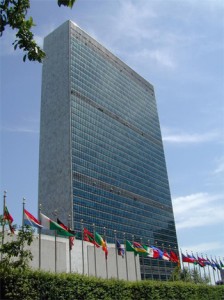Dickinson to Durban » Climate Change » Rethinking the Nation State and its Role in Climate Governance
Rethinking the Nation State and its Role in Climate Governance
Global problems like global climate change are typically seen to require global solutions. And the actors typically seen to be responsible for these global problems are the nation-states that constitute the global system. Bulkeley and Newell challenge this assumption in their book Governing Climate Change, arguing against the view that “the nation-state is the only or necessarily most important unit of climate politics” (p. 4). While I certainly agree that a “nation-state” is an inadequate unit of analysis when construed simply as the sovereign government of a state, I prefer to rethink the understanding of the nation-state rather than discredit its importance.
In support of their argument, Bulkeley and Newell demonstrate the need to expand the view of the nation-state, suggesting an alternative view of the state as “a dynamic system of strategic selectivity through which the hegemony of one social group, or historic bloc, is attained and maintained” (p. 13). They go on to say that this perspective “requires that we think through the many ways in which power is consolidated in institutions normally considered outside of the state” (p. 14). I agree with both of these points, and it is for that reason I would broaden the conceptualization of the “state” to include these other aspects.
The chief institution on the list for inclusion must be the fossil energy industry, for this vested interest is more strongly opposed to action on climate change than any other – and it has more money than any other with which to influence formal governments. I will also permit this industry to be transnational, in effect meaning that despite the division of the world into different nations, all their governments are connected by this one global industry. It then becomes quite clear where the real governance lies in climate change – with the fossil energy industry. Certainly there are competing interests and they by no means exert a total control, but their power is still sufficient to stall and undermine the efforts of other groups to take action.
Thus, my definition of a “nation-state” now includes the interactions and relative power levels of all actors within a given political division. One could even see that consumers and individual citizens have a place in the system, though their power is much less. The distinction in my thinking from that of Bulkeley and Newell is, I would say, that I still place the “nation-state” – albeit a drastically modified version thereof – as the most significant actor in climate governance. Why? Because it provides a clear pathway to effect the desired action. I maintain the perspective that states provide an effective unit through which to administer policy – they can be categorized in many useful ways (level of development, emissions levels, etc). The change, however, cannot begin from the top down as is the typical expectation of the “state-centric” model of governance; instead it must move from the bottom, grassroots level up to the reigns of state power and then back down to the bottom.
What might this look like in practice? I believe it would take the form of individuals in a given nation-state forming a collective action strong enough to topple the vested interests of the fossil energy industry (and other opponents) – thereby reclaiming political power – and then this nation-state would be able to participate in the international system to form binding commitments, which it would act upon through domestic regulations back down to the people. In other words, people need to change the system domestically in order to begin tackling global climate change as the global problem it is at the international level.
– Bulkeley, H., and P. Newell, 2010. Governing Climate Change. Routledge, New York.
Filed under: Climate Change · Tags: Bulkeley and Newell, Global climate change, Governing Climate Change, how to save the climate, Timothy Damon









we don’t have to dissolve the Nation State but refocus our goals to make it focus on the goals that are most important in climate change and awareness.